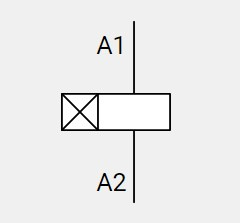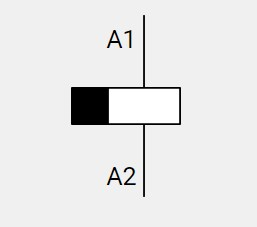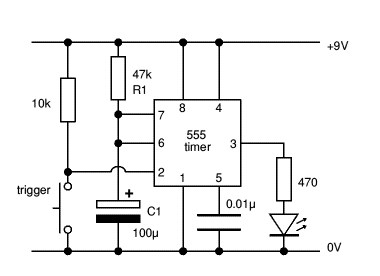OUTLINE:
A Guide to Navigating the Labyrinth of Timer Symbols Electrical
 144
144In the vast landscape of electrical schematics, timer symbols act as silent guardians of time, controlling the dance of electricity within circuits. They're precise visual codes telling a story of delays, pulses, and rhythmic activations.
What Is Timer Symbol Electrical
There isn't just one universal timer symbol in electrical schematics. Different types of timers and timer functions utilize specific symbols to convey their function and operation.
1.Basic Timers
- On-delay timer: Represented by a rectangle with an arrow pointing into the rectangle, indicating a delay before activating the output.

- Off-delay timer: Represented by a rectangle with an arrow pointing out of the rectangle, indicating a delay before deactivating the output.

- One-shot timer:Represented by a rectangle with a small circle inside, indicating it triggers only once after receiving a signal.
2. Additional Timers
- Adjustable timer: Represented by the basic symbol with a potentiometer symbol inside, signifying adjustable timing duration.
- Cycle timer: Represented by two rectangles connected by a dashed line, indicating alternating on and off cycles.
- Pulse timer: Represented by a rectangle with a short vertical line inside,indicating a brief pulse output for a set duration.
3. Advanced Timers
- Multi-stage timer: Represented by multiple rectangles connected in sequence, indicating different timing stages with specific actions.
- Reset symbol: A small circle outside the timer symbol, pointing inwards, signifies resetting the timer function.
- Trigger symbols: Arrows or other symbols placed near the timer indicate the specific trigger conditions for activation
The Applications Of Electrical Timer Symbols
Electrical timer symbols have a wide range of applications across various industries and disciplines, primarily serving two main purposes
1. Communication And Documentation:
- Schematic clarity: They visually represent timer components and their functions within electrical schematics, enabling engineers and technicians to understand circuit operation and timing sequences.
- Standardization: Consistent use of symbols facilitates clear communication and reduces ambiguity in design documents, promoting efficient collaboration and troubleshooting.
- Accessibility: Standardizing symbols allows professionals from different backgrounds to interpret schematics quickly and accurately, enhancing knowledge sharing and project comprehension.
2. Circuit Functionality And Control:
- Timing control: Different timer symbols specify various delay functions, pulse durations, and cycle timeframes, governing the operation of connected components in circuits.
- Safety and protection:By controlling activation and deactivation of specific circuits, timer symbols contribute to safety by preventing short circuits, overloads, and unexpected equipment activation.
- Automation and process control: Timers play a crucial role in automating processes and sequences in various applications, from lighting systems and irrigation timers to industrial machinery and scientific equipment.
- User experience: Timer symbols in consumer electronics schematics, like washing machines or ovens, guide users in understanding functions and setting timing options.

Here are some specific examples of timer symbol applications:
- Vehicles: Delaying headlight activation after engine start, controlling intermittent wiper functions, or setting timed cabin heating.
- Electronics: Controlling LED dimming sequences, enabling automatic light shut-off after inactivity, or setting pulse widths for signal generation.
- Industrial systems: Delaying motor startups to protect equipment,controlling ventilation cycles in greenhouses, or timing irrigation schedules in agriculture.
- Scientific research:Precisely controlling experiment durations,triggering data acquisition at specific intervals, or setting pulse lengths for laser equipment.
The Advantages Of Electrical Timer Symbols
Electrical timer symbols offer numerous advantages for circuit design, documentation, and operation, making them vital tools for professionals and enthusiasts alike.
Clear Communication And Documentation:
- Standardization: Consistent symbols across different projects and systems enable easy interpretation and understanding of timing functions by engineers, technicians, and anyone reading the schematics.
- Enhanced Clarity: Visual representation of timers simplifies complex circuits, making it easier to identify timing elements, their connections, and operation sequences.
- Reduced Ambiguity: Standardized symbols minimize confusion compared to relying on text descriptions, allowing for quick interpretation and efficient troubleshooting.
Improved Design And Functionality:
- Precision and Accuracy: Accurate representation of various timer features, such as delays, pulse durations, and cycles, guarantees precise control and predictable operation of connected components.
- Flexibility and Versatility: A diverse range of symbols cater to various timing needs, allowing for flexible and efficient design of complex timed circuits.
- Safety and Protection: Timer symbols facilitate implementing safety measures by controlling activation and deactivation of circuits, preventing short circuits, overloads, and unwanted equipment operation.
Boosting Efficiency And Productivity:
- Faster Design and Analysis: Standardized symbols allow designers to focus on functionality rather than deciphering intricate descriptions, saving time and effort.
- Simplified Collaboration: Common understanding of symbols promotes effective communication and teamwork among engineers, technicians, and maintenance personnel.
- Efficient Knowledge Sharing: Standardized symbols facilitate quicker learning and knowledge transfer across projects and disciplines, enhancing overall engineering productivity.
Conclusion
In conclusion, electrical timer symbols are powerful tools that go beyond simple circuit representation, making them vital components in the world of electrical engineering and beyond. So next time you encounter a schematic, don't underestimate the quiet power of the timer symbols – they're the hidden heroes keeping the electrical world in perfect rhythm.

Disclaimer: The views and opinions expressed by individual authors or forum participants on this website do not represent the views and opinions of Chipsmall, nor do they represent Chipsmall's official policy.

share this blog to:

